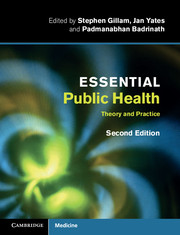Book contents
- Frontmatter
- Contents
- Contributors
- Foreword to the second edition
- Foreword to the first edition
- Foreword to the first edition
- Acknowledgements
- Introduction
- Part 1 The public health toolkit
- 1 Management, leadership and change
- 2 Demography
- 3 Epidemiology
- 4 The health status of the population
- 5 Evidence-based health-care
- 6 Health needs assessment
- 7 Decision making in the health-care sector – the role of public health
- 8 Improving population health
- 9 Screening
- 10 Health protection and communicable disease control
- 11 Improving quality of care
- Part 2 Contexts for public health practice
- Glossary
- Index
- References
5 - Evidence-based health-care
Published online by Cambridge University Press: 05 August 2012
- Frontmatter
- Contents
- Contributors
- Foreword to the second edition
- Foreword to the first edition
- Foreword to the first edition
- Acknowledgements
- Introduction
- Part 1 The public health toolkit
- 1 Management, leadership and change
- 2 Demography
- 3 Epidemiology
- 4 The health status of the population
- 5 Evidence-based health-care
- 6 Health needs assessment
- 7 Decision making in the health-care sector – the role of public health
- 8 Improving population health
- 9 Screening
- 10 Health protection and communicable disease control
- 11 Improving quality of care
- Part 2 Contexts for public health practice
- Glossary
- Index
- References
Summary
Key points
Evidence-based practice integrates the individual practitioner’s experience, patient preferences and the best available research information.
Incorporating the best available research evidence in decision making involves five steps: asking answerable questions; accessing the best information; appraising the information for validity and relevance; applying the information to care of patients and populations; and evaluating the impact for evidence of change and expected outcomes.
Although practitioners need basic skills in finding evidence, a health librarian is an invaluable asset.
There are specific checklists available to appraise research papers critically, and every practitioner should possess the skills to appraise the published literature.
The major barriers to implementing evidence-based practice include the impression among practitioners that their professional freedom is being taken away, lack of access to appropriate training, tools and resource constraints.
Various incentives including financial ones are used to encourage evidence-based practice.
Introduction – what is evidence-based health-care?
How much of what health and other professionals do is based soundly in science? Answers to the question ‘is our practice evidence based?’ depend on what we mean by practice and what we mean by evidence. Some studies have estimated that less than 20% of all health-care interventions are underpinned by robust research [1]. This varies from discipline to discipline. For example, studies examining clinical decisions in the field of internal medicine found that most primary therapeutic clinical decisions are based on evidence from randomised controlled trials [2].
- Type
- Chapter
- Information
- Essential Public HealthTheory and Practice, pp. 90 - 103Publisher: Cambridge University PressPrint publication year: 2012



